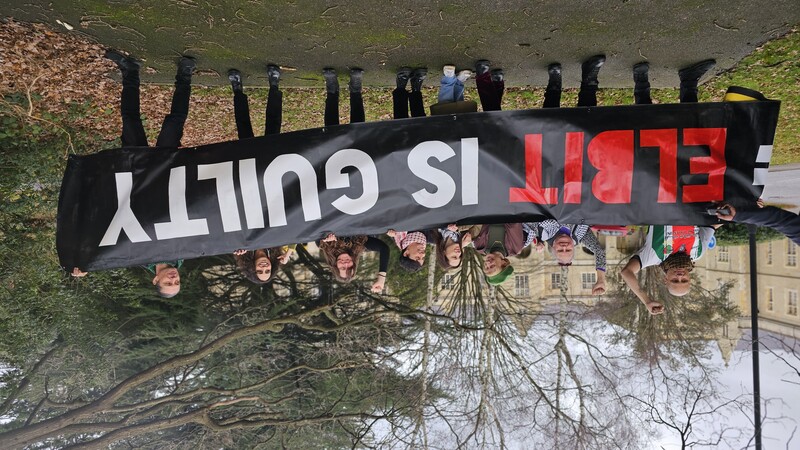The Electronic Intifada 23 December 2023

The Elbit Eight celebrate an important victory against Israel’s weapons industry.
A UK jury this week delivered a not guilty verdict on nine out of 33 charges brought against eight activists – collectively known as the Elbit Eight – who protested Israel’s largest private weapons firm Elbit Systems.
Two of the defendants have been acquitted of all of the charges against them, while the six remaining defendants have been acquitted of some of the charges that they faced.
The Elbit Eight carried out direct action protests under the banner of Palestine Action, to try and disrupt the flow of drones and other military equipment to Israel.
The case ended on 22 December, following a six-week trial held at Snaresbrook Crown Court in east London.
The UK’s Crown Prosecution Service may decide to retry the defendants on the charges on which the jury was unable to reach a verdict. The decision on whether to do so is expected by 18 January.
“How can we be the criminals when the perpetrators of… [what] we now know is a genocide … are free to profit and we have to spend weeks and weeks in court for an action that we took three years ago?,” asked Nicola Stickells, a mother of two who was raised in a working class family in the English county of Kent.
“When you try and stand for human rights, you become the criminal. This is not right.”
The indictment listed 13 separate counts which included charges of criminal damage, trespass with intent to cause criminal damage (burglary), possessing materials with intent to cause criminal damage, encouraging others to commit criminal damage and making threats to commit criminal damage.
Not all of the defendants faced the same number of charges.
“Prescient”
“I feel absolutely no guilt about any of my actions,” said Genevieve Scherer, a 77-year-old retired social worker, who was acquitted on the two counts of burglary that she faced. “I think they were prescient really, given the circumstances in which we live.”
“The only reason that a company like Elbit exists is to uphold an apartheid regime, to uphold a human rights abusing regime, to commit genocide against the Palestinian people,” said Caroline Brouard, a medical herbalist, who was found not guilty of possessing materials with intent to commit criminal damage. “It’s indefensible that this company are allowed to manufacture weapons here in the UK”
Most of the charges focused on protests outside and inside the office building where Elbit’s headquarters were based in central London. The defendants splashed what they described as red “water soluble children’s paint,” stenciling messages such as “Shut Elbit down” and chanting slogans, such as “Your profits are covered in Palestinian blood.”
Other protests targeted factories belonging to the weapons manufacturer.
“Elbit Systems is very much the muscle that is making this genocide possible,” said Jocelyn Cooney, who had to leave her job at a homeless shelter in Canada to return to the UK to stand trial.
“So I think we all have a responsibility as humans to step up and take direct action to stop this company from producing weapons to murder people,” she added.
Cooney was acquitted of the only charge she faced: possession of materials with intent to commit criminal damage.
In addition to the nine jury acquittals, there were four formal acquittals at the start of the case.
Richard Barnard was acquitted over an assault allegation after the prosecution offered no evidence in relation to it.
Robin Refualu, Caroline Bruoard and Jocelyn Cooney were formally acquitted on count one of the indictment, which alleged that they encouraged others to commit criminal damage.
Huda Ammori and Richard Barnard – co-founders of Palestine Action – were unanimously acquitted on count one by the jury on Tuesday.
An earlier indictment, which included a blackmail charge, was also quashed by the court at the start of the case.
The jury delivered a single guilty verdict.
That single verdict was against Barnard and related to one count of criminal damage involving paint sprayed on the wall of a factory belonging to Elbit subsidiary Ferranti Technologies. Elbit announced last year that it had sold off Ferranti, which was based in Oldham, Greater Manchester.
That announcement followed 18 months of sustained direct action.
One of the counts which the jury was unable to come to a decision over involved a three-day occupation of Elbit’s UAV Engines drone factory based in Shenstone, near Birmingham, in September 2020.
Five members of the Elbit Eight were charged with criminal damage relating to their role in the Shenstone occupation.
An Electronic Intifada podcast discussion about the Shenstone occupation, which Ammori appeared on, was repeatedly played and referred to by the prosecution.
“This trial is not about us, it’s not even about Palestine Action, in my opinion” said Robin Refualu, whose mother is Dutch and whose father came to Europe as a refugee from the Maluku Islands, having been born on a boat during World War II. “It’s about what’s happening in Gaza at the moment and what’s been happening in Palestine for the last 75 years.”
“I wish there was a verdict [on all of the charges], whatever the verdict would be,” Refualu added. “But, either way, however we are feeling and whatever we are going through, it’s nothing compared to what Palestinians go through when they get caught up in the military court system by the oppressor, which is Israel, obviously.”
Mohamed Elmaazi is a UK-based journalist, who contributes to numerous outlets including Jacobin, The Dissenter and Consortium News.







